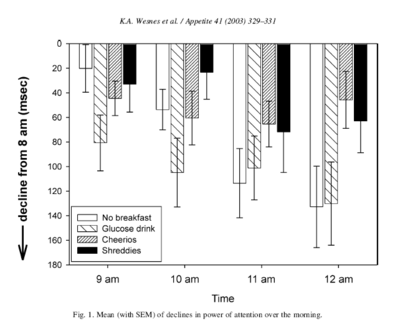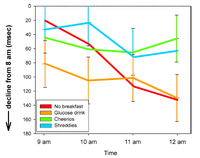February 28, 2007
Silver for My Geometry
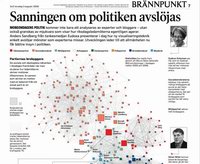 (links only in Swedish for this entry)
(links only in Swedish for this entry)
I have just touched the lower slopes of the information graphics Mount Parnassus (where, I assume, Edward Tufte sits at the top throwing sparklines at bad designers and wasters of data ink). Svenska Dagbladet got a silver in the category informative graphics in the Society for Newspaper Design competition for a debate article I had made the basic content. Of course the real praise and congratulations should go to Anders Mildner, Joakim Larsson and Susen Schultz who did the real work on the article.
I remember standing in a doorway on Hythe street to avoid the pouring rain debating with them over the cellphone about what interpretation one could give to the principal component axes in my diagram. In the end they wisely dropped that figure, and that was probably what led to victory. Less is more, especially when it comes to confusing diagrams. They also did the important work of adding explanatory details, the photos and turning my rather messy left-right scale in a clearer diagram, among other things.
Anders Mildner blogs about the background of the article here.
In my case it started when I had to make exercises for a neural network course many years back and I let my students classify various datasets using neural network methods. One set was US congress voting records, and a bright student wondered if he could use Swedish voting records instead. He did, and I used some of the Rixlex data in subsequent courses. Another bright student (Axel Liljenkrantz) discovered that it seemed to be very low-dimensional (he needed just two hidden neurons in a backprop net to categorize it) and that got me interested in making visualizations. I did a principal component analysis and various spring models, some of which ended up as a VR simulation people could enter into using the KTH CAVE. Unfortunately our seminar when we presented it was just the day after a political scandal, so we only got one visitor, and he was mostly wondering if this was what his tax money was used for.
Over the years I developed other political visualisations, putting some of them online. Eventually I managed to put it all together into my report, which became the basis for the article. I hope to make this kind of report a yearly occurence, measuring how the political network changes over time. But as my experience with SvD shows, it takes more than good software and math to make an accessible report.
February 26, 2007
My Name is Anders and I'm Addicted to Existence!
 A very silly deathist sentiment was expressed by Professor Richard Nicholson as a response to the birth and survival of Amillia Taylor:
A very silly deathist sentiment was expressed by Professor Richard Nicholson as a response to the birth and survival of Amillia Taylor:
"Should one really be trying at all to keep that baby alive?" asks Professor Richard Nicholson, editor of the Bulletin of Medical Ethics. "Chances are it will require an enormous amount to be spent on it for the rest of its life. We have much less experience of death, so we have become much less willing to accept it. In countries where infant mortality is higher it would be seen as absurd. We live in a society where we have become addicted to physical existence. It's totally unsustainable. Our attempts at the moment to keep every human physically alive as long as possible will make it less likely that the human race will survive climate change."
I still wonder how climate change could kill the human race. But the silliest aspect is that somehow our 'addiction to existence' will make us vulnerable to die out. If we are so addicted, wouldn't we be fighting any threat far more fiercely than mystics accepting their eventual fate?
I guess there is some hint of religion in the term addiction to physical existence - maybe if we learned to enjoy not existing we would be happier? The only way to make that plausible is to assume dualism and that nonphysical existence is OK. If it is better than physical existence we would of course be morally obliged to prevent a descent into matter.
Presumably the real reasoning is the relative simple observation that we are spending resources in ways that are inefficient and doesn't increase human happiness as much as other ways of spending them. Fair enough. There is something excessive in how western societies have enshrined giving birth to a genetic child as a core value, that should be achieved at any cost. Many of the most controversial reproductive technologies are justified this way, and apparently their use is acknowledged even by many sceptics as a valid use. While I can understand the drive for having a child of one's "flesh and blood", going for adoption would (at least where/if an efficient adoption market exists) improve human welfare even more.
Similarly there might be great wins if we learn to be less neurotic about death. A lot of people are so afraid of dying that they are not really alive. Having witnessed death up close, I can't say it is anything impressive. It is simply an awful waste, but it is an unavoidable fact of life. Even with life extension and software backups we will be vulnerable, since we are metastable systems in a universe dominated by randomness and entropy. In the long run we will all be dead, although it might be from death forward. Learning to deal with the impermanence of one's identity and context is important.
But none of this is strong enough to make existence addiction worthy of adding to the long list of addictions we are supposed to cast off!
What about these addiction criteria for existence addiction?
- Existing more often or in larger amounts than intended.
- Unsuccessful attempts to quit; persistent desire, craving.
- Excessive time spent in survival.
- Feeling existence at inappropriate times, or feeling fear when existence is threatened.
- Giving up other things for it.
- Continued life, despite knowledge of harm to oneself and others.
- Marked tolerance in which the amount of life needed to satisfy increases at first before leveling off.
- Characteristic withdrawal symptoms (fear of death)
- Continuing existing to relieve or avoid fear of death.
I would say they describe the normal human condition. Reacting exessively to them might be unhealthy, but clearly a person who tries to commit suicide is not healthy. The first point seems to suggest that human striving for excellence is bad.
OK, I just took the typical addiction criteria and translated them. It is the hallmark of addictification and popular among people attacking e.g. computer games. By putting books into the criteria rather than drugs we can easily prove that academics are addicted and need to be cured. The criteria only demonstrate something amiss when the drive to fulfill the 'addiction' become so strong that human flourishing becomes impaired. But existence itself is a prerequisite for all forms of human flourishing, so it is hard to overdo it.
It seems that as usual the bioconservative position is backwards. If long lives become meaningless, why aren't people in short-lived societies happier? If valuing life and continued existence impairs acting for long-term survival, why do we see the truly short-term strategy of suicide bombing not among the rich westerners but disadvantaged mid-easterners? How come the rich world spends so much on conservation and environmentalism (including a very expensive push for climate control) while the poor world do not appear to make a proportional effort?
Rather than give up existence addiction we should culture it, just as we have done with caffeine addiction. We have created a culture and practical knowledge surrounding when it is approporiate to drink coffee and how much. We acknowledge the downsides while using the upsides, enjoying the drug and its carriers for flavor and cultural attributions. Similarly we ought to culture our existence addiction: we should learn to curb its neurotic components while develop our abilities to prolong healthy, expanding lives and enjoy struggling for existence.
February 25, 2007
Don't Arrest Andrea!
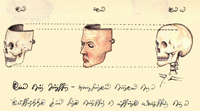 Andrea Sandberg is a female graphics designer living quite close to where I grew up. She has a past as an officer in the Swiss navy, but recently decided to aim for a career as an artist. But she does a bit of consulting for the biotech company Pentapod Corporation.
Andrea Sandberg is a female graphics designer living quite close to where I grew up. She has a past as an officer in the Swiss navy, but recently decided to aim for a career as an artist. But she does a bit of consulting for the biotech company Pentapod Corporation.
Andrea is fictional, a persona I use when I have to sign up for websites and do not feel like disclosing my personal information. No doubt she has millions of relatives, many living at zipcodes such as 123 45 or with email addresses like foo@foo.no. But a new EU proposal will seek to outlaw using fake information to set up email accounts or websites, Wired reports.
This is apparently a spin-off from the Orwellian data retention directive, and of course concerns about making it easier for law enforcement to track down criminals and terrorists are used to motivate it. But it also seems like a godsend to marketers, who no longer have to worry about salting of their databases with Andreas. Sure, preventing fake users would reduce the potential for spam and anonyous threats. But it would also remove the shield of privacy from most users. As always it is the law abiding and clueless users who lose the most, the criminal high-tech users will be able to get around it. It is not that hard to get an anonymous account overseas or set up a Tor network - something the new legislation will have to ban if it wants to stay effective.
What is at stake is the freedom to contruct an arbitrary online persona. I have, like many, multiple personas for different uses. My Second Life self is different from my website who is different from the persona my travel agency knows. Some are hermetically separated, others could with some diligence be linked to each other or my physical self. The reasons for having multiple personas are manifold, from practicality over different social networks to legal and deeply sensitive matters - I might not want anybody to know that I frequent www.goldfishsex.com or have a cricket paralysis virus infection. In many cases I want to be very sure my identity is secure, since even expressing interest in some areas might be enough to cause trouble (I'm surprised that NSA has not yet flagged me for being a bit too interested in the exact chemistry of uranyl salts, security at Venezuelan supercomputing centers, the function of airport metal detectors and the detailed regulations for DHS personell - all issues I have in my opinion had perfectly legitimate reasons to study).
The usual response is to assume that forcing a strong link between the core person and its personas could be done in a privacy-sensitive way. If only the government has access to stored data, then there is no trouble. The main problem with this is of course trusting the government. They have been known in the past to violate privacy, behave incompetently, being corrupt or just uncaring. Even if you trust your local government, what about of other allied governments? EU-level data retention combined with the EU arrest warrants and other forms of international cooperation likely mean that another, far less trustworthy government, can claim access. Especially if it makes up a claim that the information is relevant for antiterrorism. The US is a warning example: since 911 not only has many legal protections been wiped out as soon as national security is invoked, but local law enforcement happily re-label meth labs as chemical weapons and a pipe bomb as a weapon of mass destruction. And of course, the US has forced the EU to share data before. In a globally networked world, any system is only as secure as the least secure system it is connected to, and this goes for law enforcement too.
Even if governments were 100% trustworthy and competent, there is another party involved in creating an online persona. The provider of the online service where the sign-up occurs has a vested interest in getting as much valuable information from the user as possible. A forced link between person and persona will pass through the system on its way to the government, and it appears hard to legislate that it cannot be used by the service. EU database and privacy directives might limit how far the information can be spread, but they seem to be effective mosly when dealing with formal organisations. Many are simply under the radar and can't be trusted to handle the information. What does www.goldfishsex.com do with the credit card numbers it requests "for age verification"? When I try to join a racist forum to do undercover journalism, how do I prevent them from storing my real address, enabling physical retaliation when I tell the world about them?
Making entering erroneous information illegal when setting up an relation with an online system is also problematic from an enforcement perspective. We make mistakes when writing our names. People systematically distort their age. Some information while true simply has the wrong format to be entered, forcing the user to lie. If it is not illegal to make mistakes, then a lot of privacy conscious people will make mistakes. The alternative is cryptographic authentification. But even if such a system would be implementable (writing this in anti-identity card Britain it seems problematic) it would suffer the problems of incompatible systems. Witness the forcing Katrina victims to use a particular web browser or the problems of running e-identity cards with organisations that do not support Linux. Mandatory authentification works best in hardware and software monocultures. And those are the most vulnerable to fast-spreading attacks. Would increasing the risk of major Internet disruptions and the establishment of government-supported perpetual monopolies be worth the advantages of identification? Unfortunately the drawbacks occur in other fields than law-enforcement, so they might not be recognized by the people proposing more authentification.
Anonymity is often undesirable for setting up trustworthy social structures. One reason the Internet is as it is is the strong anonymity it provides. Hence many online forums are plagued by trolls, spammers and con men. But it also enables amazing new forms of expression, freedom from many constraints imposed by local culture and views, and a way for many disadvantaged groups to network. An internet based on total anonymity is just as undesirable as one with no anonymity or conditional anonymity.
Accountability should be the goal: when I do something bad, it should be possible to hold me accountable for it. But the level of accountability, who meters out the punishment and the reliability of the system must be kept under control. It should also be symmetric: everybody and every institution should be equally accountable. Strong person-persona links are not in themselves enough for accountability, since they might be asymetric and do not guarantee the proper level of accountability. Hence the most important part of any online accountability system must be the social and political control over the accountability, and in particular checks and balances on how it is being used.
Perhaps one compromise might be a reciprocal data retention directive. This is based on the general reciprocity principle: any extension of authority into our private lives must be balanced by a equal or larger extension of transparency in the authority. It is not just citizen data traffic that should be retained, but all government and law enforcement traffic. And after a fixed period it must be made public or at least requestable. The design goal ought to be that any misuse of these powers will become visible. Minor misuse might be ignored, but anybody trying to use the system for sinister or questionable purposes will know that after (say) ten years their use will become public (or seen by an oversight committe not sharing the collegial ties of the agent).
Implementing it might be tricky, but there are both legal, social and technological ways of facilitating it. The important thing is to realize that this might be the only way to get the benefits of traceability without too many drawbacks, and that it hence ought to be a political goal for anybody wanting a well-functioning, accountable society.
[ The image is an illustration from the indispensable Codex Seraphinianus. ]
February 24, 2007
Bookish Bacteria
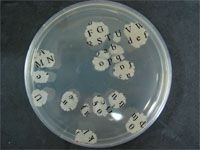 A ScienceDaily story, Storing Digital Data In Living Organisms tells of a paper describing how to store information in living organisms.
A ScienceDaily story, Storing Digital Data In Living Organisms tells of a paper describing how to store information in living organisms.
Converting a message into DNA isn't hard or new, and has been demonstrated a number of times. Perhaps the most impressive demonstrations are Eduardo Kac's installations Genesis (where mutating bacteria evolved a bible sentence), and Move 36 (where a plant contains a gene coding the sentence "Cogito, ergo sum"). Signatures or watermarks can be added. Messages can be hidden in DNA microdots, where the secrecy of the message is both protected by the problem of discovering the microdot and the complex background of human DNA in it - to find the message the right PCR primer sequence has to be known.
Tomita's team inserted a very short message into the genome of Bacillus subtilis. Rather than just insert it once, they inserted four versions. The first was a straight translation of the binary into nucleotides (each 4 bits turned into two nucleotides). The second had the bits shifted one step to the right before being translated, the third two steps and the fourth three steps. These casettes of DNA form a nice error-correcting RAID code, enabling long-term storage.
They say:
"Hence, adopting and developing further codes and experimental methods or inserting plural fragments into the partial volumes of multiple-species metagenomes will enable the storage of huge volumes of data in heritable media. We suggest that this simple, flexible, and robust method offers a practical solution to data storage and retrieval challenges in combination with other, previously published techniques"
Given that the 3.5Mb genome of Synechocystis PCC6803 has been put into B. subtilis 168, there ought to be space for at least 218,750 byte messages in it. But assume a spore is 1.2 microns in diameter. That gives a data density around 1.9*1024 bits/m3. That beats the 5.5*1017 bits/m3 in existing holographic storage and the 1018 bit/m3 of two-photon dyes and is on the same order of suggested nanotechnological storage.
But of course that is a big overestimate. There is no practical way to transfect every spore individually with a 0.2 meg message, it would be useful to have redundant spores, and reading a genome currently takes 24 hours - it would be an excessively slow and expensive storage for large volumes of data. Even with far faster sequencers and better plasmid vectors (and working in parallel) it seems unlikely that readin and readout would take less than tens of minutes.
Storing a library this way "just in case" would require a very expensive effort both to encode, purify the spores and decode again. Maybe a way of hiding away data in a seedbank, but it seems so much easier to laser-engrave it on inert metal. Maybe it is better for spies smuggling data in microdots (or as stomach bacteria!), but unless bacterial transformation and sequencing becomes everyday activities it seems less effective than (say) steganographing the data into a collection of tourist photos in a camera.
I think the real use of this kind of information storage will be when the bacteria themselves can exchange and process the information. There are obvious links to synthetic biology and wet nanotech. But maybe somebody will eventually try out Stanislaw Lem's idea of eruntics - teaching bacteria to write themselves.
February 23, 2007
SimHospital
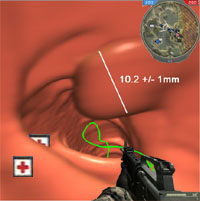 This week on CNE I blogged about how surgeons become better at laparoscopic surgery by playing computer games and how computer games might be good training for doctors or patients.
This week on CNE I blogged about how surgeons become better at laparoscopic surgery by playing computer games and how computer games might be good training for doctors or patients.
There are already SimHospital-like games and a plethora of educational games from immunology over neuroscience to patient simulators of varying complexity for medical education. Applications such as virtual colonoscopy are serious, but handling them definitely requires computer game skills. Given how this kind of virtual close examination of a patient's tomographic "shadow" is likely to become ever more important in the future diagnosis-care chain these skills are going to be in high demand.
However, it would be more interesting with games that taught potential patients how to become better patients and doctors to become better at different specialities. It seems to me that games that promote good self-maintenance (roleplaying games where people work hard on improving their avatars?) and deductive abilities might make better power patients, assuming of course people carry over those skills to other domains. The surgery skill study suggests that the hand-eye coordination and understanding of mediated reality games provide help, and games can improve peripheral attention and enumeration ability. But these are fairly low-level abilities. Maybe I have a too academic view of medical reality, but it seems to me the real benefits would be games that train high-level medical cognition.
Apropos educational games, mouse party has to be one of the strangest drug information animations I have ever encountered. It is strange because it is so focused on the microlevel and non-judgemental - personally I think this might be the best kind of drug information possible, but it is completely alien in the current war on drugs climate. Not to mention slightly cruel to the mice, but they do not seem to mind.
February 12, 2007
The School Board was just Practice
 Overcoming Bias: More Lying mentions the interesting finding that judges on the Swedish Migration Board are no better than students at recognising the signs of lying.
Overcoming Bias: More Lying mentions the interesting finding that judges on the Swedish Migration Board are no better than students at recognising the signs of lying.
We have been discussing lying on Overcoming Bias for some time now. People are in general bad at detecting lying, even when they have that as a job - and such "experts" are often utterly convinced that they know what they are doing. It looks like it is possible to get better results in detecting deception and even to train away some of the overconfidence, but that requires "experts" to admit there is a problem.
Overall, the legal system seems to be suffering from serious biases. Lawyers attempt to manipulate jury bias (with mixed effects, since they are bad at predicting how the jurors would vote). Worse, police have a strong confirmation bias making them fix on suspects even when the evidence begins to point in another direction. Once the pressure on a subject builds, False confessions become probable - and of course convinces courts far more than they should.
I was reminded of this today by a story in The Economist about how the Japanese legal system manages to extract confessions from 95% of all people arrested, followed by a 99.9% conviction rate in the courts. Given the number of cases where innocence has been proven in the far more lenient US system, this likely sums up to a horrendously large number of innocents in prison, even if the arrests were better targeted.
It is interesting to note that at least in some experiments groups can be more accurate than individuals in judging whether someone is truthful or lying. By discussing different cues they could make a better estimate than individuals, who often fix on a single cue like eye contact. In particular, groups with more hung judgements were more accurate - they could recognize situations where they could not make a good judgement. As individuals we are less likely to do so. On the other hand, individuals tended to be biased to believe people tell the truth, while groups lacked that bias.
In the case of the Swedish immigration boards it is not hard to imagine many of these biases acting (except that they are unlikely to force people to sign false confessions). However, as Stuart pointed out, there is one group who is better than most at detecting deception: convicted criminals. Maybe we should make serving on the migration board a punishment for repeat offenders?
February 08, 2007
Banking and Insuring Stem Cells
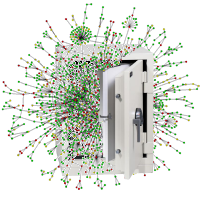 This week I blogged on CNE about the new public-private umbilical cord blood bank. The Virgin Health Bank may turn out more useful than we could possibly think today because of advances in regenerative medicine that enable new uses of stem cells. It could also become totally obsolete if the advances go so far that normal cells can be turned into stem cells. But in any case, it is breaking the assumed barrier between a for profit stem cell storage company and a public charity providing needed transplants. That is going to be good in any case.
This week I blogged on CNE about the new public-private umbilical cord blood bank. The Virgin Health Bank may turn out more useful than we could possibly think today because of advances in regenerative medicine that enable new uses of stem cells. It could also become totally obsolete if the advances go so far that normal cells can be turned into stem cells. But in any case, it is breaking the assumed barrier between a for profit stem cell storage company and a public charity providing needed transplants. That is going to be good in any case.
This raises the interesting issue of gambling on future medical advances. Cryonics already does this in a spectacular and controversial fashion. Storing stem cells is a less radical gamble (we already know they can be useful for some things, but we don't know if they will ever prove useful for our particular maladies).
There are also fields where progress appears to have been reliable. Life expectancy has increased roughly linearly for over a century. The median age of survival in cystic fibrosis has increased from 6 months in 1959 to 36.8 years in 2006, and over 2002-2006 (4 years) 5 years of life were added - CF patients might have reached a breakeven point.
Might we use known areas of medical progress to bank on things that are currently not useful but will be useful in the future? Stem cells are an obvious choice, but there might be other tissues that could also be banked. Reproductory cells seem to be a low-hanging fruit given the ever more radical infertility treatments. Blood is already useful and might gain other uses in the future. Maybe we should start documenting our healthy metabolome, kineome and proteome when we are young, somehow. Having a backup never hurt.
February 07, 2007
How Power Corrupts
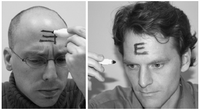 Here is an interesting cognitive bias: people feeling in power tend to not consider the perspectives of other people - quite literally.
Here is an interesting cognitive bias: people feeling in power tend to not consider the perspectives of other people - quite literally.
In Adam D. Galinsky, Joe C. Magee, M. Ena Inesi, and Deborah H Gruenfeld, Power and Perspectives Not Taken, Psychological Science, 17:12, 1068-1074 2006 researchers primed a group of test subjects by asking them to write down a memory where they held power over other people, while another group were asked to write about a time when others had power over them. Then the subjects were asked to quickly write the letter 'E' on their forehead.
High-power subjects were about three times as likely as low-power subjects to draw the letter oriented so it would be readable by themselves rather than readable by others.
In follow-up experiments it was found that high-power subjects also tended to assume other people had the same information that they had (the "telepathic boss" problem - the boss assumes that everybody knows what he knows and want). They were also less accurate than low-power subjects at judging emotional expressions. There were also anticorrelations between reports of general feelings of being in power in one's life and tendency to take other's perspective. Overall high-power people seem to anchor too heavily on their own vantage point and this impairs their ability to consider what others see, think and feel.
People with less power likely have to consider other people’s intentions and views more strongly, so perhaps the power bias is actually the real baseline and powerless people concentrate more on mind reading. But given the increase in errors in emotion reading the power mode people had compared to people primed neither with being powerful or powerless, this seems unlikely.
What are the implications of a power bias? In general power bias would make the empowered people tend to think they have more support from others in their views than they have. Altruists in power would be even less concerned with individual variations in goals and values - i.e. they would tend to become more egalitarian and paternalist. Egoists in power would become more concerned about the ambitions of others, i.e. paranoid.
Is this bias rational? When leading other people the cognitive load of taking their perspective might be cumbersome, and the increase in stereotyping that seem to occur in people in the "power mode" might also be a form of attention management. Imposing one's own goals onto others might also make them obey more effectively. For leading people to perform particular goals this mode might work better. The downside is that if the task is heavily reliant on individual achievements meshing together or more based on voluntary action a lack of perspective risks missing early signs of trouble and will produce rebellion. The researchers suggest that power and perspective taking might not have to exclude each other and that responsible leadership might be possible by learning to take both into account. But they do not cite any actual experiments showing that it works.
Maybe we should just promote people with Asperger syndrome to management in favour of people with intact theory of mind. That way we will not reduce the total human ability to see things from other perspectives.
February 05, 2007
Fighting Bad Enlightenment Business Practices
 Recently Keith Henson was arrested in Arizona for his anti-Scientology activism. Keith is one of the ur-transhumanists, active in the L5 society and featured in Ed Regis' The Great mambo Chicken ("In the future, three out of four people will be Keith"). A very impressive person who has dared to take an active and costly stand against a pretty nasty organisation.
Recently Keith Henson was arrested in Arizona for his anti-Scientology activism. Keith is one of the ur-transhumanists, active in the L5 society and featured in Ed Regis' The Great mambo Chicken ("In the future, three out of four people will be Keith"). A very impressive person who has dared to take an active and costly stand against a pretty nasty organisation.
Scientology in many ways represents the danger of one-way transparency. The organisation exploits information from its members and the rest of society, but fiercely defends its internal structure and teachings from scrutiny.
All religions claim to possess unique revealed knowledge, but most are only too eager to dispense this "knowledge". Scientology is interesting in that it instead tries to keep it on the inside: it is a modern mystery cult. But unlike (most) cults of antiquity they charge for initiation.
I don't see anything necessarily bad about that.
The main problem with religions in society tends to be that they claim society should conform to their morals, and that gives society a legitimate right to scrutinize their claims (and that usually leads to an epistemic battle). But a religion that does not publicly claim society must conform to its ideas (and Scientology as far as I know doesn't seem to be arguing this, unlike most other religions) does not invite that form of scrutiny.
There are also valid reasons for religious privacy: to avoid oppression, freedom of thought, that spirituality is inherently personal and hence naturally part of the private sphere, etc. But religious privacy for individuals does not imply a right to privacy for religious organisations when they interact with the rest of society, just as the right to political privacy among people does not imply that it is improper to scrutinize political organisations and their activities. To the extent the activity overlaps with society it should be transparent.
This is where I think Scientology is not playing fairly. Even the most minimalist libertarian government has a legitimate interest in keeping business transparent, ensuring that deals are fairly made, contracts upheld and conflicts resolved by the rule of law. If Scientology is selling enlightenment, then that business should be transparent. Are people getting what they pay for? Are there unfair information advantages? Are conflicts resolved properly?
The evidence seems to suggest that there are problems with the business ethics of the church. Some might be inherent in mixing business with religion, since religion almost by definition involves subjective states, vulnerable people and methods of causing psychological change that are not under the control of the worshipper. But the existence of front organisations that conceal their ties to the church go far beyond that. The intense reactions to the leaked NOT documents also show that the desire to retain strong and profitable information asymmetries appear to be driving, and that collateral damage to outsiders regarded as irrelevant.
This is really what makes the organisation so odious. It applies the framework instituted to protect business to prevent criticism and free speech, as well as society's legitimate concerns about exploiting vulnerable members. This damages the law and causes chilling effects on public discourse - a cost the church does not bear.
Most religions include a strong in-group identity and a negative view of the out-group: they are essentially paranoid to some degree. A rational company in the enlightenment business would defend its profitable trade secrets as long as it was economical but no further. Scientology (and/or members) seem to go further, driven by this us vs. them perspective to harass individuals. It would actually have been better for everybody if the church was as cynical and money-grubbing as caricatured.
I hope future versions of Keith will be able to look back at this episode and chuckle. But for now we should be thankful for (and help) his struggle to improve the business ethics of the enlightenment trade
February 02, 2007
Shredding the Shreddies
 Carl / home away from home is shredding a piece of infographics on Nestle Cheerios (found via information aesthetics). Being a trainee crotchety old infovis/cognitive enhancement git myself, I can't resist weighing in.
Carl / home away from home is shredding a piece of infographics on Nestle Cheerios (found via information aesthetics). Being a trainee crotchety old infovis/cognitive enhancement git myself, I can't resist weighing in.
If we leave out the amazingly bad graphics, there is still the data. First, there is apparently no attribution of where it came from, except that it was done by CDR and Reading Scientific Services. No paper citation, no link. Is that too much to ask for? While a scientific paper may still scare away people, these days nobody will run screaming away from the breakfast table when encountering an URL. To my mind any unreferenced claims like this should be regarded as "we made it up".
But being an obsessive info-hoarder I actually recognized the data! It comes from Wesnes KA, Pincock C, Richardson D, Helm G, Hails S. Breakfast reduces declines in attention and memory over the morning in schoolchildren. Appetite. 2003 Dec;41(3):329-31. Not made up and a peer reviewed journal, but funding bias might of course be a problem.
Here is the diagram from the original paper:
It is not a very good graphical design. Points for showing the decline of attention as going downwards rather than some inverted scale, as well as showing the error bars. But since it is supposed to show a time course the bars make it very hard to see what is happening except that the last two bars tend to stay high.
This is how I would have done it. Maybe the colors should not have been used out of concern of color-blind readers (and Appetite is in black and white I think), but I find reading different markers and dashes cognitively effortful. Error bars are cruicial but hard to do when they overlap - but it is the overlaps that matter, since they tell us when there is a chance of statistical significance.
Carl says:
"First of all, every condition shows a decline in concentration overall - with 8am as the benchmark! I can't concentrate on walking at 8am! Downhill from that is comatose!!"Being a late riser I can only agree. Maybe the 12-year olds were excited by going to a real lab for testing? But given the amount of boring tests they quickly began to lose interests. How would you feel after doing Word presentation, Immediate Word Recall, Picture Presentation, Simple Reaction Time, Digit Vigilance, Choice Reaction Time, Spatial Working Memory, Numeric Working Memory, Delayed Word Recall, Word Recognition and Picture Recognition as well as 16 bipolar ratings of mood and alertness - four times each day, for four days? So the graph shows the decline from "hard to walk" to comatose and beyond.
Carl:
"If a glucose drink is the only competition then Cheerios can't be doing too well against anything more sensible."The zero baseline apparently corresponds to a normal breakfast. So apparently a normal breakfast is not much better than Cheerios (or no breakfast, at least at 9 am!) Perhaps most normal breakfasts are a bowl of Cheerios and something else like a glass of orange juice. In general various studies have found that glucose does improve cognition so the discrepancy in this study is a bit odd.
My conclusion is that the graph is not pseudoscience or just advertising. It might be somewhat weak research (29 participants, but at least they were gender balanced and the test was apparently a standard test) and there is the nagging doubt that maybe the funding source (Cereal Partners UK) might have biased it, but it is not nonsense. Not even when the advertising people redrew the graph did it loose all information - for once there was a vertical scale and they even stated a unit, but they forgot to tell what it actually measured. And they added a zero point, which is absent in the paper graph and not a bad idea. Compared to much stuff out there this was a masterpiece of scientific communication.
Rereading this post I realize that I have completely failed at being crotchety enough. Hmm, I better start looking for graphs on my cereal boxes.
February 01, 2007
WikiRaman
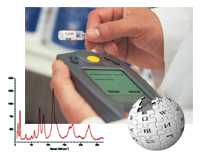 This week on CNE Health I talked about ways of detecting fake drugs, in particular the exciting possibility of using spatially offset Raman spectroscopy to peek inside transparent packaging and check that the chemical spectrum really corresponds to what the drug is supposed to be.
This week on CNE Health I talked about ways of detecting fake drugs, in particular the exciting possibility of using spatially offset Raman spectroscopy to peek inside transparent packaging and check that the chemical spectrum really corresponds to what the drug is supposed to be.
While such a system is obviously useful for centralized checkpoints in the supply chain and random inspections by authorities, it is even more interesting if customers, pharmacists and other people can easily get their hands on cheap portable screening devices. It would enable far more fake detection as well as a way of quality control.
What would be needed is a public database of Raman spectra for every drug, which doesn't sound too hard to make. If producers and governments won't supply it I don't see any problem in making a WikiRaman (or perhaps WikiSpectrum) site where people simply scan their drugs and upload the spectrum to the site. This way we could get a sense of variability too. If a RFID or barcode reader is included we would have a efficient way of linking stated drug names and suppliers with the spectrum too.
This works not just for pharmaceuticals but for other kinds of drugs too. Among illicit drug users many forms of quality control are used, but many are little more than superstition. If drug quality was easier to measure many lives would likely be saved. Ecstasy purity tests have been distributed as a harm reduction strategy. Having SORS scanners might enable wider testing (especially if the users of WikiRaman can be assured that there is no tracking of what they scan, either because the site is run independently of law enforcement, has downloaded the right spectra to an onboard library or because of anonymizing communications software asking for a dozen of "popular" spectrums).
So what we need is a cheap, portable, reliable SORS scanner that can easily upload a spectrum to a site and compare it with stored templates. RFID/EAN reader capability would be welcome too. We also need open standard formats for Raman spectra. None of this seems terribly hard to do.
Drug counterfiters might of course try to find ways to fool the scanners such as adding substances to packaging to confuse the spectrum, coating ineffective drugs with the real drug and so on. But the pressure quick and ubiquitious testing puts on them and the cost of many of these measures seem likely to bring down the practice. Again, WikiRaman and perhaps an adjoint database of shared information about observed drug qualities linked to their appearance and identifications would help a lot (some interesting challenges in designing these to resist attacks from counterfiters).
In the long run having devices able to at least identify if a substance is what it is supposed to be might be helpful far beyond drugs. It might be the second easiest way of checking whether it is sugar or salt one is adding to the cake.
